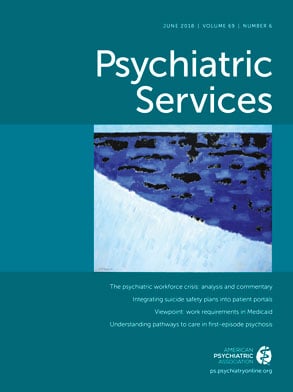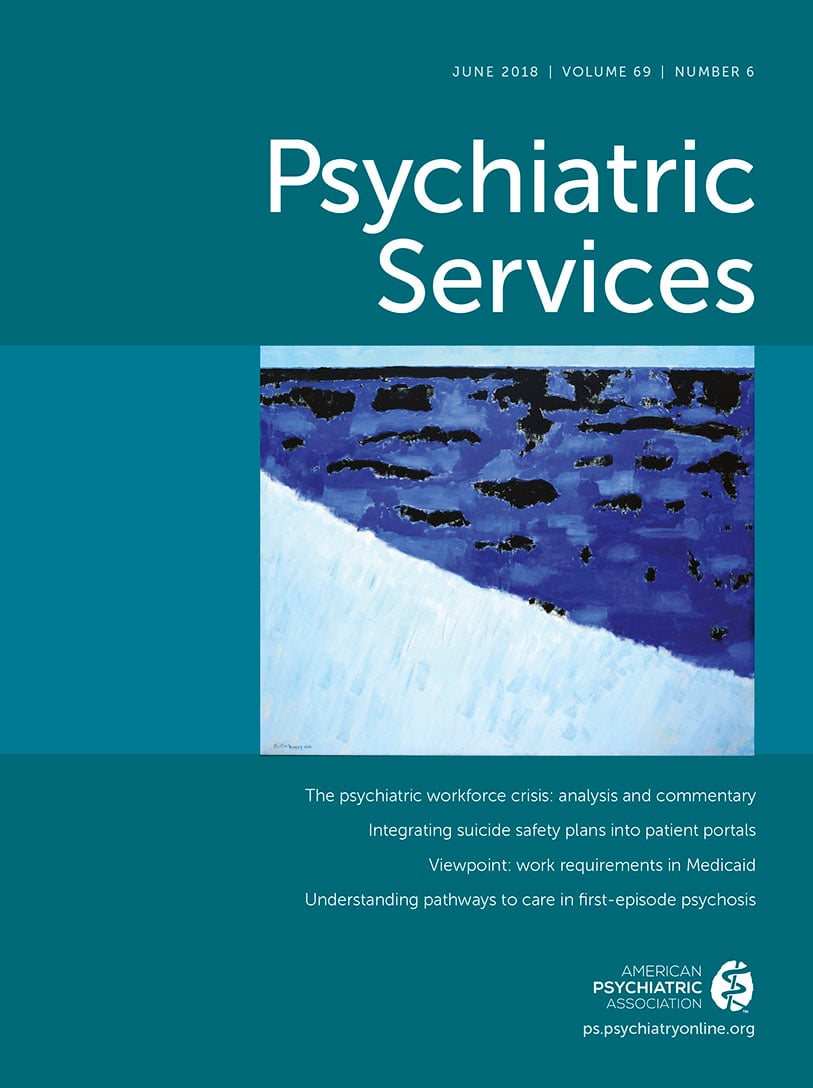The U.S. Department of Health and Human Services (DHHS) recently issued new guidelines on conditions that must be met for states to implement work requirements in their Medicaid programs. Ten states are in the process of seeking waivers so that they can implement such work requirements, and Kentucky already has an approved waiver. The current DHHS position is a departure from prior practice. Under previous administrations, both Republican and Democrat, such requests were not approved because imposing work requirements was viewed as inconsistent with Medicaid’s goals of expanding insurance coverage and access to care (
1). Proponents and opponents of work requirements disagree about the net effects of such requirements on employment and the risks these requirements pose to health care access for vulnerable groups.
Adults with mental or substance use disorders are an important group to consider in evaluating the effects of work requirements. Mental illnesses and substance use disorders are prevalent among Medicaid recipients, affecting nearly one-third of working-age adult beneficiaries, and they directly affect functioning in ways that compromise the ability to work. About 36% of Medicaid-eligible low-income people with any mental illness and 44% of those with a serious mental illness do not work. Even under the waivers that are being considered, some beneficiaries will not be required to work to maintain eligibility. They will be exempted from work requirements because they qualify for Medicaid on the basis of a work disability under Social Security criteria. However, only about half of Medicaid-eligible adults who have a mental illness and do not work are classified as having a disability according to these criteria (
2). What will happen to the others?
The DHHS guidance and various state applications for waivers recognize that people who are “medically frail” but do not meet the Social Security criteria should also be exempted from work requirements. Unfortunately, because of the nature of serious mental illness and substance use disorders and the cognitive problems associated with those illnesses, the “medically frail” exemption process will be challenging to implement, both for states and for beneficiaries. This means that work requirements will likely lead many people with mental or substance use disorders to be removed from Medicaid rolls. Moreover, taking Medicaid—and the care it finances—away from people with these conditions is likely to further reduce their participation in work.
States with waivers seeking to implement a medical frailty exemption will need to establish a definition of frailty that considers mental and substance use disorders. The difficulties of developing and implementing such a definition are highlighted in studies of the application process for Social Security disability benefits. Well-established and uniform national standards have long been used for assessing psychiatric disability in determining eligibility for these benefits. Despite years of experience with the standard, however, there is a great deal of inconsistency, and consequent error, in the disability determination process across states. For example, one study examined the experience of low-income women who applied for Supplemental Security Income (SSI) benefits but whose applications were rejected (
3). Although they appeared not to meet the disability criteria, these women fared worse over time, in terms of housing stability, than either those approved for SSI or similar women who did not apply. They were just half as likely to work following the determination as similar women who did not apply for SSI.
These difficulties of adjudication will be multiplied for mental illnesses and substance use disorders. In part, that is because these conditions are often comorbid with chronic general medical conditions, making classification difficult; 18% to 25% of individuals with a psychiatric disorder have co-occurring mental and substance use disorders, and over 20% of those with a mental illness also report their physical health to be fair or poor. Another reason why adjudication will be difficult is that the effects of mental illness on work outcomes vary over time. Many people with mental illness have intermittently recurring disabilities; their conditions may be stable for some period with medication and appropriate treatment, but stability may be punctuated by exacerbations that can lead to deteriorations in functioning until work is not possible. These realities will make an already difficult adjudication process even more complex.
The complexity of adjudication, and the need to verify and periodically reassess, will also add administrative burden for states, providers, and beneficiaries, thereby increasing Medicaid’s administrative costs. On the state side, the adjudication process will need to be implemented, and there will need to be an appeals process. Providers will need to attest to medical frailty in order to keep patients enrolled, and this too will add administrative burden. The most consequential administrative burdens, however, will fall on patients themselves.
The burden of establishing medical frailty related to work requirements generally will fall on the recipient. In the case of mental illness and substance use disorders, that means it falls on a person who has a condition that, by definition, interferes with cognition, executive function and mood, and sometimes mood and drive. Decades of policy and practice have been invested in encouraging—even compelling—people with mental or substance use disorders to seek out and maintain care because the conditions themselves interfere with decision-making and care-seeking processes. In fact, many people with a mental illness who are initially rejected by the Social Security process do not appeal or follow up simply because their conditions prevent them from dealing with the paperwork and administrative processes. Likewise, studies of access to care in the Veterans Health Administration reveal that navigating the “system” poses important obstacles to veterans with mental illnesses. Scheduling and keeping appointments, explaining problems, obtaining transportation, and excessive wait times can all result in reduced help seeking and treatment (
4). Many people impaired by mental or substance use disorders will surely exit the Medicaid program because of incomplete paperwork or for not reporting on changing circumstances.
Making access to Medicaid and the treatment it finances harder for people with mental or substance use disorders will almost certainly make them less likely–not more likely–to work. Randomized trials show that people who receive evidence-based mental health treatments are better able to succeed in the labor market (
5) than those receiving usual care. Similarly, the results of the Oregon health insurance experiment showed that people who were enrolled in Medicaid had substantially lower rates of depression and fewer restricted-activity days (including for work). Access to treatment, not denial of treatment, promotes labor market participation for people with mental illnesses and substance use disorders.

